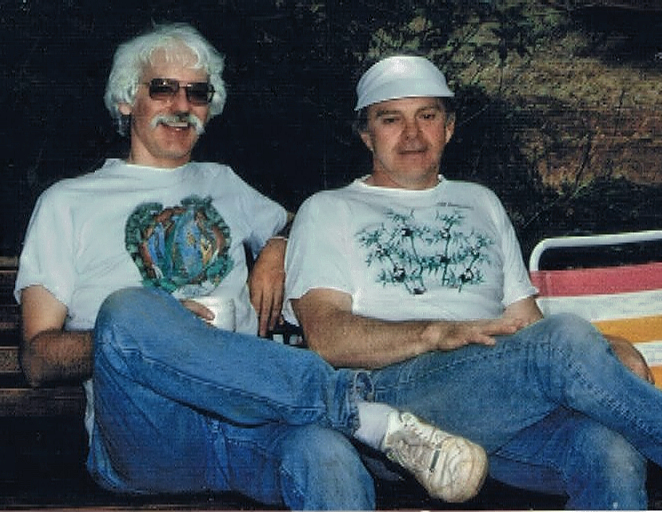Most of the times I’ve been homeless, I saw it coming. Even the one time my future ex-wife suddenly threw me out, I was emotionally stable enough to make a walk-away crash landing. I had a pickup truck and enough money to put my stuff in storage.
In 1987, however, it was a total crash-and-burn. If it weren’t for a Communist ex-monk, I would have become hopelessly homeless …
Sometimes, I feel like I’m sentenced to life without parole.
I didn’t jump off the Foresthill Bridge (see part one) because killing myself would hurt too many people who love me. Especially my son.
Suicide is an incredibly selfish act.
Although I’ve been obsessed with triple-redundant suicidal ideation most of my life, I actually started out my sometime peer-counseling career as a drug abuse/suicide hotline counselor. I think I saved a few lives.
In August 1987, I celebrated my 40th birthday with a mid-life crisis. My doctor declared me disabled and filed a psychiatric workers compensation on my behalf.
I’d been working 80+ hours at a highly stressful job as a small-town newspaper editor. This was something I could do, apparently, for about four months before hitting the wall emotionally and physically.
Employers hate psych claims. Their insurance company promptly informed me the law said they didn’t have to deal with my claim for 90 days, and they weren’t going to.
If my friend Marty hadn’t pestered me into coming to live with him and his kids in Sacramento, I would have just become another lost, homeless soul. A danger to myself and others.
As corny as it sounds, Marty has a heart of gold and a steel will.
Marty is the only person I know who is more radical than I am. He approaches social activism with the attitude of a street fighter and the passion of a religious zealot, which he once was.
He ran an open home, hosted big, fun parties and secret political meetings. We advocated for fathers’ rights – everything from visitation rights to diaper-changing stations in men’s restrooms.
I earned my keep by cooking, cleaning, repairing things, refinishing a monster dining room table, ghost-writing for him, and most important, watching his kids when his job took him on the road.
It was a running joke between me and the kids that I was in loco parentis when “Pa” was away. As a babysitter, I was a disappointment to them. I couldn’t be conned. I followed Marty’s instructions to the dots on the I’s.
On the other hand, we had fun. Maria and Stephan were amazed that I could watch kids’ movies with them and say the characters’ lines before they did and predict what was going to happen next.
Well, yeah. I had an MFA in screenwriting from UCLA and 10 years’ experience in the industry. I made it into Variety, Hollywood Reporter and the Writers Guild of America, West, but none of the scripts I wrote or doctored ever made it to the screen. It was sort of like making it into the NFL but never getting in the game.
It takes luck, talent and hustle to make it in Hollywood. I had the luck and the talent, but I just didn’t have the who-you-know-who-you-blow hustle. Singer/songwriter Dory Previn said it best: “If [Hollywood is] anyone’s idea of heaven, who do you have to fuck to get into hell?“
Actually, I really was “loco,” and after I won my psych claim, I had the papers to prove it.
When she took me out of action, my doctor told me, “You shouldn’t live alone.” So, as much as I initially resisted it, living with Marty and the kids was the best thing for me. It was an intense but emotionally supportive environment.
While I was waiting for the insurance company to do the right thing, I reached into my ditty bag of self-help. I grew up in a dysfunctional, alcoholic home (think Burton and Taylor in Who’s Afraid of Virginia Woolf? with real children).
As soon as I “got the hell out of Dodge” (well, Salina, Kansas actually), I sought help through UCLA’s student health services. I knew I was messed up. That’s why I was a psych major.
I continued therapy after college, so I wasn’t exactly helpless once I had a safe place to think about what to do with the rest of my life. After my crash-and-burn as a newspaper editor, I needed to program some success.
School. That was something I was really good at. I already had two degrees from a world-class university, so I checked out Sonoma State University. Back then, it was a small school known for its creative writing program and non-traditional (i.e., working adults) student body.
I interviewed Jerry, the writer-in-residence. He told me he taught screenwriting using a book called Screenplay by Syd Field. “Oh yeah,” I said. “I know Syd. I took his class when he was writing the book.”
Shortly, before Christmas in 1987, with the help of a good lawyer, I won my psych claim.
What happened next cost the Auburn Journal and their insurance company tens of thousands of dollars in compensation, psychiatric treatment and vocational rehabilitation.
I used part of my settlement award to enroll in Sonoma State. I didn’t need another degree, so I created an independent studies program in creative writing, computer applications and tennis.
It was a killer, three-hour drive each way. Shortly, after school started, I got back to Marty’s home about 10:30 p.m., Jan. 22, 1988. I was able to catch the last half of an NBC news special called Home Sweet Home.
That’s when I learned I was “technically homeless.”
To read part one, click here. In part three, the final part of this series, I finally get psychologically diagnosed, psychiatrically treated, and vocationally rehabilitated. And I find my own home.











